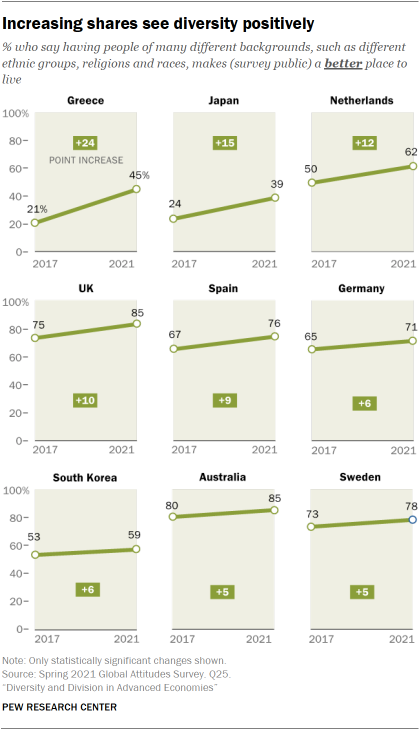Most embrace diversity but see conflicts between partisan, racial and ethnic groups
Wide majorities in most of the 17 advanced economies surveyed by Pew Research Center say having people of many different backgrounds improves their society. Outside of Japan and Greece, around six-in-ten or more hold this view, and in many places – including Singapore, New Zealand, the United States, Canada, the United Kingdom, Australia and Taiwan – at least eight-in-ten describe where they live as benefiting from people of different ethnic groups, religions and races.

Even in Japan and Greece, the share who think diversity makes their country better has increased by double digits since the question was last asked four years ago, and significant increases have also taken place in most other nations where trends are available.
Alongside this growing openness to diversity, however, is a recognition that societies may not be living up to these ideals: In fact, most people say racial or ethnic discrimination is a problem in their society. Half or more in almost every place surveyed describe discrimination as at least a somewhat serious problem – including around three-quarters or more who have this view in Italy, France, Sweden, the U.S. and Germany. And, in eight surveyed publics, at least half describe their society as one with conflicts between people of different racial or ethnic groups. The U.S. is the country with the largest share of the public saying there is racial or ethnic conflict.
Read more here : https://www.pewresearch.org/global/2021/10/13/diversity-and-division-in-advanced-economies/
Related Posts
- 57The US New Home Sales report is essential for assessing the housing market's health and the overall economy. It reflects consumer confidence and economic conditions, impacting job creation and monetary policy. Influenced by interest rates, economic health, demographics, and government policies, this report illuminates broader economic trends and aids stakeholders…
- 56The US Conference Board Consumer Confidence Index measures American public sentiment on economic conditions, impacting spending and growth. The index, derived from surveys, has two components: Present Situation and Expectations. High consumer confidence spurs spending, while low confidence may curtail it. Employment, economic news, and political events shape confidence, which…
- 54The Weekly EIA Crude Oil Inventories report is essential for gauging oil supply and demand, impacting global oil prices. It reflects market conditions, with inventory increases signaling oversupply and decreases indicating higher demand or supply cuts. Events like COVID-19 or Hurricane Katrina dramatically affect inventories and prices, making the report…
- 54The US Durable Goods Orders report is a key economic indicator that shows the volume of new orders for long-lasting manufactured goods, signaling business and consumer investment confidence. It helps gauge economic health, business investment trends, and influences market sentiment and policy decisions. The report, excluding volatile transportation orders, offers…
- 51Whatever managers previous fears about remote work, the pandemic has proved that most knowledge workers can get their daily tasks done just as well from their living rooms as from the office. Study after study confirms most people's personal experience that, at least for those without child care, health, or…